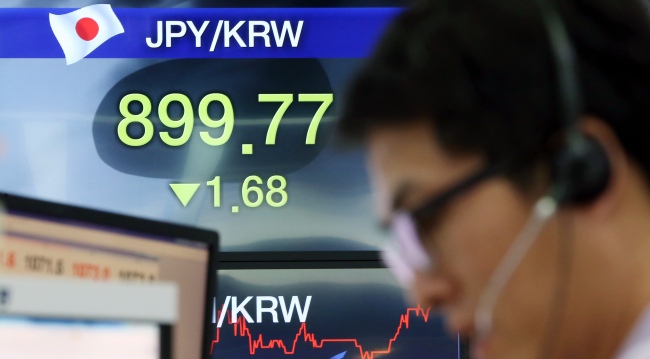The South Korean won touched a new seven-year high against the Japanese yen Tuesday, prompting local currency authorities to vow to take appropriate measures if needed.
The won-yen arbitrated exchange rate stood at 898.52 per 100 yen as of 3:02 p.m., the highest since Feb. 28, 2008, when the comparable figure was 889.23. The local currency closed at 1,070.00 per dollar, up 3 won from the previous session’s close, hitting a six-month high.
“We are closely watching the currency market,” said an official at the Finance Ministry. “If a one-sided movement continues, we will fine-tune it (to control the pace),” he said, adding that a set of measures to stem the won’s sharp ascent to the yen would be put in place.
Market players speculate the currency authorities may intervene in the market by selling dollars.
The won-yen arbitrated exchange rate stood at 898.52 per 100 yen as of 3:02 p.m., the highest since Feb. 28, 2008, when the comparable figure was 889.23. The local currency closed at 1,070.00 per dollar, up 3 won from the previous session’s close, hitting a six-month high.
“We are closely watching the currency market,” said an official at the Finance Ministry. “If a one-sided movement continues, we will fine-tune it (to control the pace),” he said, adding that a set of measures to stem the won’s sharp ascent to the yen would be put in place.
Market players speculate the currency authorities may intervene in the market by selling dollars.

The U.S dollar serves as the benchmark currency for the exchange rate between the two, which tend to move together in their rates to the greenback.
The won’s rally versus the Japanese yen is a major concern for the country’s policymakers as the two countries directly compete in overseas markets over products ranging from electronic goods to autos.
The won’s ascent against the Japanese currency came as the yen continued to remain weak against the greenback on the back of Japanese Prime Minister Shinzo Abe’s campaign, dubbed Abenomics, to end years of deflation and listless growth through massive fiscal and monetary policy easing measures.
In contrast, the won has recently pared its loss against the dollar as Asia’s fourth-largest economy logged a trade surplus for the 38th straight month in March and foreign investors snatched up a huge chunk of local stocks.
South Korea’s trade account has been in the black since February 2012.
Foreign investors also have scooped up a net 4.6 trillion won worth of South Korean stocks this month alone, channeling more dollars into the economy, which in turn boosts demand for the local currency. Also, end-month dollar selling by local exporters has added downward pressure on the won-dollar rate.
“The won-dollar rate has come under increasingly downward pressure, and South Korea’s currency authorities seem to be reluctant to intervene, which in turn causes the won-yen rate to further fall,” said Jeon Seung-ji, an analyst at Samsung Futures Co.
Analysts said the won would further gain versus the dollar as the U.S. Federal Reserve is expected to take a somewhat dovish stance in its policy statement for April, which works to help the dollar remain weak against its major global counterparts. The won’s rally versus the Japanese yen is sounding an alarm bell among policymakers as the weakening of the Japanese currency comes at a time when South Korean exporters’ outbound shipments are losing steam.
South Korea’s outbound shipment growth decelerated for the fourth straight year as the global economic slump cut demand and weak oil prices lowered the export prices of key products.
According to the data compiled by the Korea Investment Trade Association, the country’s exports increased 4.4 percent last year in terms of volume, well higher than the global average expansion of 3.1 percent.
But the 2014 figure compares with a 4.8 percent gain in 2013 and a 5.6 percent rise in 2012. The reading also marks a sharp slowdown from a 13.9 percent expansion in 2011 and a jaw-dropping
22 percent growth in 2010.
The country has also seen its export prices decline for the third consecutive year, posting falls of 3.7 percent, 1.9 percent and 2.2 percent in 2012, 2013 and 2014, respectively, the data showed.
Separate data compiled by the Bank of Korea also showed that the contribution of exports to South Korea’s economic growth fell to a five-year low last year as outbound shipments were hurt by a slower-than-expected global recovery.
Of South Korea’s 3.3 percent economic growth last year, 1.5 percentage points resulted from overseas shipments of goods and services.
This translates into a contribution rate of 45.5 percent, the lowest since 2009, when numbers reached minus 28.6 percent as the global economy was hit by the financial crisis. A negative reading means exports actually brought down overall growth. (Yonhap)
-
Articles by Korea Herald



![[Exclusive] Korean military set to ban iPhones over 'security' concerns](http://res.heraldm.com/phpwas/restmb_idxmake.php?idx=644&simg=/content/image/2024/04/23/20240423050599_0.jpg&u=20240423183955)




![[Herald Interview] 'Amid aging population, Korea to invite more young professionals from overseas'](http://res.heraldm.com/phpwas/restmb_idxmake.php?idx=644&simg=/content/image/2024/04/24/20240424050844_0.jpg&u=20240424200058)

![[Pressure points] Leggings in public: Fashion statement or social faux pas?](http://res.heraldm.com/phpwas/restmb_idxmake.php?idx=644&simg=/content/image/2024/04/23/20240423050669_0.jpg&u=)









